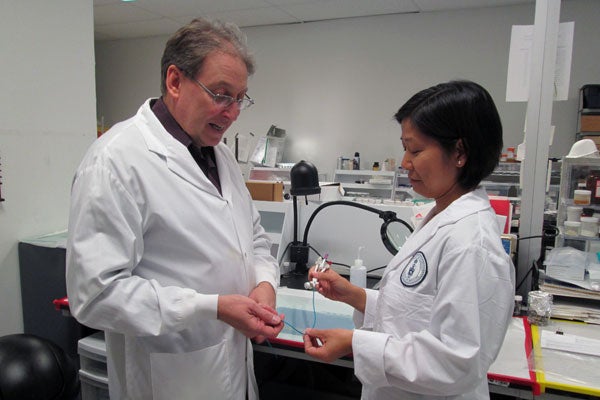
Making medical devices safer: Manning Award for Paul Santerre
Published: October 8, 2014
A groundbreaking medical innovation developed and brought to market by Professor Paul Santerre has won top prize from the 2014 Ernest C. Manning Innovation Awards.
“Paul Santerre is a trailblazer in biomaterials and biomedical engineering,” said Cristina Amon, dean of the Faculty of Applied Science & Engineering. “Not only is he pioneering innovative research, but he is also transferring his findings directly to market so they can improve health care for people around the world.”
A professor with the Faculty of Dentistry and the Institute of Biomaterials & Biomedical Engineering (IBBME) (which spans the faculties of Applied Science & Engineering, Medicine and Dentistry), Santerre won this year's Principal Award for his surface modifying macromolecules.
Known by the trade name Endexo™, Santerre's macromolecules solve an important dilemma in medical care. When patients are fitted with tubing devices – used for everything from kidney dialysis to blood transfusions – those tubes can cause dangerous and even life-threatening blood clots to form. Manufacturers can coat the devices with anti-coagulant drugs such as heparin but those drugs can strip away from the tubing and enter the body.
Santerre's solution? Add Endexo to the devices during manufacturing so that the macromolecules are embedded throughout the device. The molecules don’t shed, and their success rate at preventing blood clots has been extremely high – reducing incidents of clots by as much as 87 per cent in lab tests that simulate blood circulation in the body.
Santerre, who also won the NSERC Synergy Awards for Innovation for his research leadership in 2012, commercialized the intellectual property through startup company Interface Biologics Inc., which then developed the molecular technology into several products. With the backing of major investors and licensing agreements with AngioDynamics, a leading U.S.-based biomedical device company, the company cleared major regulatory hurdles in North America and Europe to bring products to market.
Within its first year of sales, Peripherially Inserted Central Catheters (PICC) containing Endexo took 45 per cent of the Canadian market alone. Now, with new licensing partners, the PICC is poised to enter the dialysis market in the U.S., worth an estimated $2 billion.
“The Manning award is a recognition that the University of Toronto is driving and enabling the world class research of its academics to be translated into unique and transformative technologies for the health care field,” said Santerre, urging decision-makers at all levels of government to “capitalize on the potential economic opportunities that exists in Canada,” especially those available through university research networks.
“Throughout his career here at the University of Toronto’s Faculty of Dentistry, as well as at IBBME, Paul has consistently demonstrated outstanding innovation in the field of biomaterials research that has brought him international recognition.” said Daniel Haas, dean of the Faculty of Dentistry,
Catharine Whiteside, dean of the Faculty of Medicine and vice-provost, relations with health care institutions, called Santerre a talented and innovative research leader.
"The success of Interface Biologics is yet another example of how U of T-born research can lead to new clinical applications and economic success," Whiteside said. "I congratulate him on earning a Manning Award.”
Transforming intellectual property into booming businesses has become something of a trademark for U of T in recent years, said Amon. The university consistently tops the rankings of North American schools for startup activity, according to research conducted by the Association of University Technology Managers (AUTM).
(Read about all of the winners of this year’s Manning Innovation Awards in Maclean’s magazine.)
Erin Vollick is a writer with IBBME at the University of Toronto.



